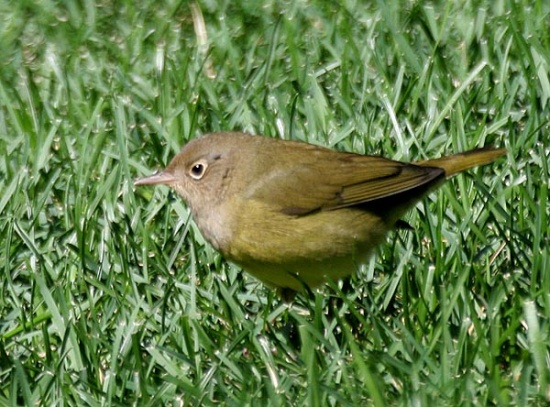(User template. Attempt to clean-up copied text.) |
|||
| Line 1: | Line 1: | ||
;[[:Category:Oporornis|Oporornis]] agilis | ;[[:Category:Oporornis|Oporornis]] agilis | ||
| − | [[Image:Connecticut_Warbler.jpg|thumb|550px|right|Photo by Glen Tepke <br> Photographed: Boston, Massachusetts, USA]] | + | [[Image:Connecticut_Warbler.jpg|thumb|550px|right|Photo by {{user|Glen+Tepke|Glen Tepke}} <br> Photographed: Boston, [[Massachusetts]], [[USA]]]] |
==Identification== | ==Identification== | ||
| − | + | 15 cm | |
| + | *Light yellow underparts | ||
| + | *Olive upperparts | ||
| + | *Light eye ring | ||
| + | *Pink legs | ||
| + | *Long tail | ||
| + | *Pale wing bars | ||
| + | *Thin pointed bill. | ||
| + | |||
| + | '''Males''' have a grey hood; '''female''' and '''immature''' browner with a whitish throat. | ||
==Distribution== | ==Distribution== | ||
| − | + | '''Breeding''' Central [[Canada]] from central eastern [[British Columbia]] east to central [[Quebec]]; also in northern [[Minnesota]] and northern Great Lakes. | |
| + | |||
| + | '''Winter''' [[South America]]. | ||
| + | |||
| + | Rare '''vagrant''' in the western [[United States]]. They have an unusual migration pattern, moving north through the center of [[North America]] in spring and south along the Atlantic coast in the fall. | ||
==Taxonomy== | ==Taxonomy== | ||
This is a monotypic species. | This is a monotypic species. | ||
| − | Possibly | + | Possibly hybridizes with [[Mourning Warbler]]. |
==Habitat== | ==Habitat== | ||
| − | + | '''Breeding''' bogs or open deciduous woods near water, especially with poplar or aspen. The nest is an open cup well-concealed in moss or a clump of grass. | |
==Behaviour== | ==Behaviour== | ||
| − | + | Elusive | |
| + | |||
| + | ==Status== | ||
| + | Their numbers may be in decline due to loss of winter habitat. | ||
| + | ==References== | ||
| + | Answers.com | ||
==External Links== | ==External Links== | ||
{{GSearch|Oporornis+agilis}} | {{GSearch|Oporornis+agilis}} | ||
[[Category:Birds]] [[Category:Oporornis]] | [[Category:Birds]] [[Category:Oporornis]] | ||
Revision as of 19:43, 26 February 2009
- Oporornis agilis
Identification
15 cm
- Light yellow underparts
- Olive upperparts
- Light eye ring
- Pink legs
- Long tail
- Pale wing bars
- Thin pointed bill.
Males have a grey hood; female and immature browner with a whitish throat.
Distribution
Breeding Central Canada from central eastern British Columbia east to central Quebec; also in northern Minnesota and northern Great Lakes.
Winter South America.
Rare vagrant in the western United States. They have an unusual migration pattern, moving north through the center of North America in spring and south along the Atlantic coast in the fall.
Taxonomy
This is a monotypic species. Possibly hybridizes with Mourning Warbler.
Habitat
Breeding bogs or open deciduous woods near water, especially with poplar or aspen. The nest is an open cup well-concealed in moss or a clump of grass.
Behaviour
Elusive
Status
Their numbers may be in decline due to loss of winter habitat.
References
Answers.com




